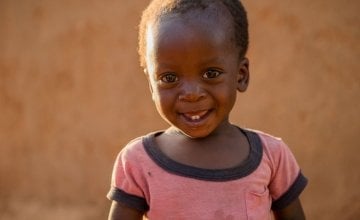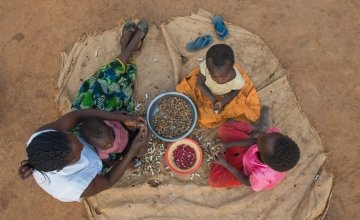
Read our 2023 annual report

Knowledge Hub
Can breastfeeding help the fight against poverty?

Good nutrition is essential to eliminating chronic poverty and making lasting development gains. To mark World Breastfeeding Week, we look at breastfeeding’s positive impact on improved nutrition in Zambia.
Mary Banda, 37, lives with her five children and husband in the village of Tambo, Zambia. Mary, like any mother, is proud of how her youngest child is developing.
He started crawling at around five months and was walking at nine months.
Marthiasimboela is 15 months old and Mary’s youngest child – her first since she started receiving training and advice from Concern through its award-winning Realigning Agriculture to Improve Nutrition (RAIN) programme.
Mary explained the difference the project has made:
When my other children were the same age as Marthiasimboela they had only just started crawling. He is the first child that I exclusively breastfed for six months and he is stronger than all the others were. He hasn’t suffered from the diarrhoea that they had.

Importance of breastfeeding
Concern respects the choices made by mothers: whether to breastfeed at all, whether to do so in combination with formula feeding, and how long to breastfeed for. These decisions are each influenced by the unique circumstances surrounding a mother and her baby.
In the developing world, however, contamination of artificial milk or infant formulas due to unclean water and poor hygiene conditions can quickly lead to malnutrition, illness and death in infants. In a world where close to 7 million children under the age of five die each year – 45% from malnutrition – the promotion of breastfeeding over potentially unhygienic alternatives can be critical.
Holistic approach
Of course while breastfeeding – as recommended by the World Health Organisation – has been identified as a key component in preventing malnutrition, it can only succeed in combating this problem as part of a more holistic approach. The RAIN programme in Zambia therefore aims to promote household-level agricultural and dietary diversification and nutrition/health behaviour change especially targeted at families with small children and pregnant or nursing mothers.
Mary explains this more holistic approach, describing the things she has learnt on the Concern programme:
I have learnt which foods are best to grow, which ones are nutritional, how to grow them and also the best ways to cook. I now know the importance of colostrum and that I should exclusively breastfeed for six months. I know how to take better care of my children. I also received a goat and it recently gave birth to a billy goat.
Farming is the Banda family’s main source of income but Mary sometimes works on other people’s farms when they need extra money. The family grows maize, soya beans, sweet potatoes and amaranths for use as leaf vegetables and cereals. In addition to a goat, Mary received a chicken from Concern – the eggs added another nutritional dimension to the family’s diet.
Mary is now producing surplus food and is planning to use the money she makes to ensure her children get an education. Her three eldest children are already in school and she hopes her other children will also be able to attend when they are old enough.
Mary Banda was interviewed by Concern’s Deborah Underdown in May 2014.
Follow Concern
Keep up to date with all of Concern's work and follow us on Instagram.





